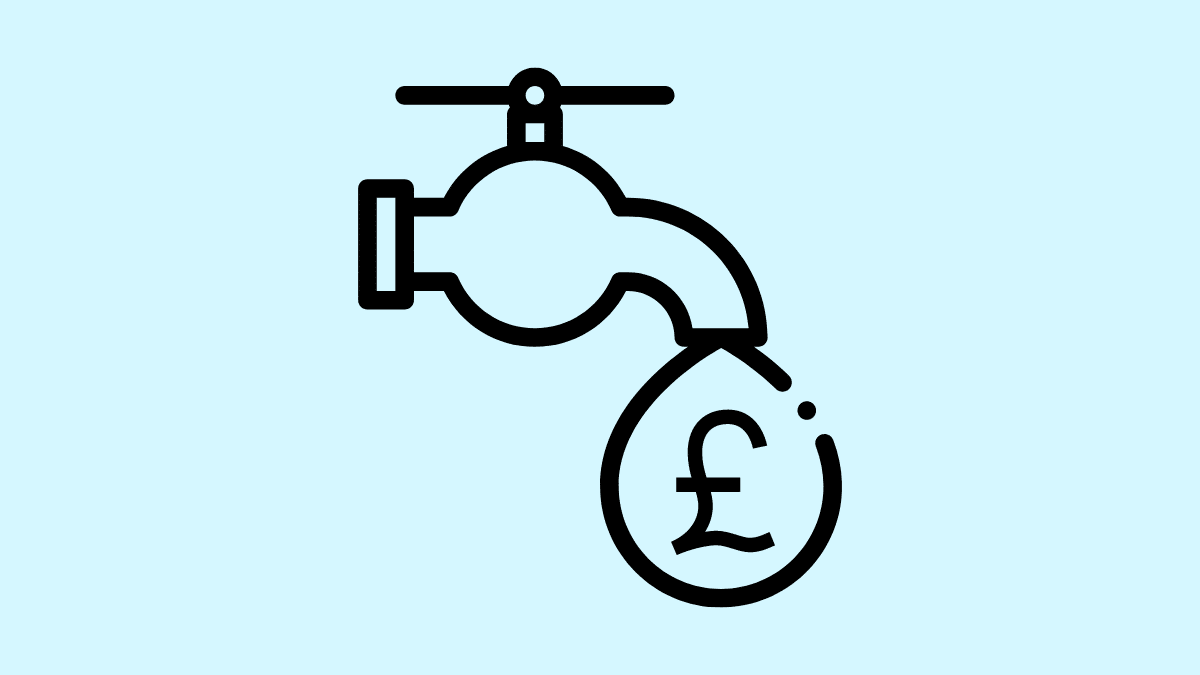Find out how to reduce water bills with money saving tips, plus details on lower priced tariffs, and finding financial support schemes.

£10 BONUS OFFER: Earn easy cash by watching videos, playing games, and entering surveys.
Get a £10 sign up bonus when you join today.
Water bills across the UK are set to increase by an average of 6%, adding roughly £27 more to annual household expenses.
This will be around £2.30 a month extra, depending on where you live, and will start from April 2024, so be sure to update your budget.
With increasing costs to household bills, we’ve looked at some ways you can get your outlay down that you might not have thought about before.
Why can’t we switch water suppliers?
Before we jump into the money-saving tips, let’s tackle a common question: Why can’t we switch water suppliers as we do with energy providers?
The water industry in the UK works differently.
It’s based on geographical areas, each with a single supplier.
This setup is due to the massive infrastructure needed to supply water – it’s just not practical to have multiple companies laying pipes in the same area.
So, unlike energy, where competition can help drive prices down, in the water sector, we’re pretty much anchored to one provider.
Water saving tips
There are several ways to reduce your water bill and make those extra pounds less noticeable.
Ask for a social tarriff
Social tariffs are a lifeline for those anyone who find their water bills too high.
They offer a reduced rate for eligible households, typically those on low incomes or receiving certain benefits.
Eligibility criteria vary between water companies, but generally include:
- Being on a low income or receiving income support, jobseeker’s allowance, pension credit, or universal credit.
- Having a high water usage due to a large family or a medical condition.
Contact your water supplier directly to find out if you’re eligible and how to apply.
Each supplier has different criteria and application processes, so it’s important to get the specifics for your area.
Financial support
Around two millions households are getting support with their water bills, which is double the amount than last year, but more can get help and it’s out there.
They can offer support such as:
- Reduced tariffs: Lower rates for eligible customers
- Payment breaks: Temporary relief from bill payments for people facing financial difficulties
- Writing off debt: In certain cases, part or all of the outstanding water bill debt may be forgiven
If you’re struggling, get in touch with your water supplier.
WaterSure
For low-income families with high water usage due to essential needs, the WaterSure scheme is available.
It caps bills for people who use a lot of water due to large families or specific medical conditions.
You must be on a water meter or have applied to have one, be on certain benefits and have a high essential use of water (such as certain medical conditions or having three or more children under 19).
You need to apply directly with your water company and provide evidence.
Priority Services Register
The Priority Services Register offers a wide range of assistance, not just financial, to various individuals.
It includes those with sight, hearing, or mobility difficulties, and parents with babies under 12 months old.
Registering can provide give support and services to meet your specific needs.
Get a water meter
If you don’t have one already, installing a water meter could be a game-changer for your bills.
It allows you to pay for exactly the amount of water you use, rather than a fixed rate.
This is particularly helpful for smaller households or anyone who use water sparingly.
Many water companies will install a meter for free, and if you find it doesn’t save you money, you can usually switch back within the first year.
Reduce your usage
If you are on a water meter, there are a few things you can do to prevent over using water and get your bills lower.
Fix those drips
A dripping tap might seem minor, but it can waste a staggering amount of water over time.
Fixing leaky taps and ensuring your toilet isn’t running can save litres of water daily.
It’s often as simple as replacing a washer or adjusting a float ball.
Shower power
Opt for showers over baths.
Showers generally use less water, especially if they’re kept brief.
If you’re feeling brave, turning off the shower while soaping up can save even more!
And why not consider a water-efficient showerhead?
They’re designed to use less water without compromising your shower experience.
Full loads only
Whether it’s your washing machine or dishwasher, make sure you run them only when they’re full.
This approach makes sure the appliance is running to full efficiency, and you’re not wasting water on half-empty cycles.
Water-smart gardening
Love your garden?
Collect rainwater in a water butt for watering plants.
It’s free and better for your plants compared to treated tap water.
Also, consider drought-resistant plants that require less watering.
Mindful usage
Simply being more conscious of the water you use can make a big difference.
Turn off the tap while brushing your teeth, limit using hosepipes, and reuse water when possible (like collecting cold water as it heats up for the washing up for plants).
Final thoughts
While we can’t control the price of water, we certainly can control how we use it.
By trying out these tips, not only will you save money, but you’ll also be contributing to a more sustainable and environmentally friendly way of living.